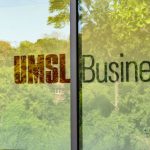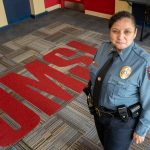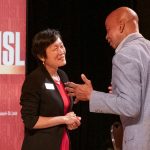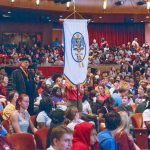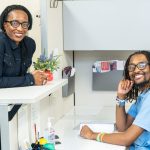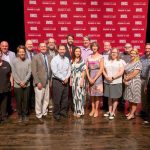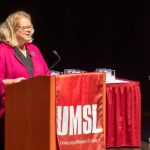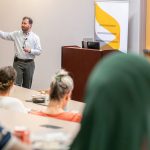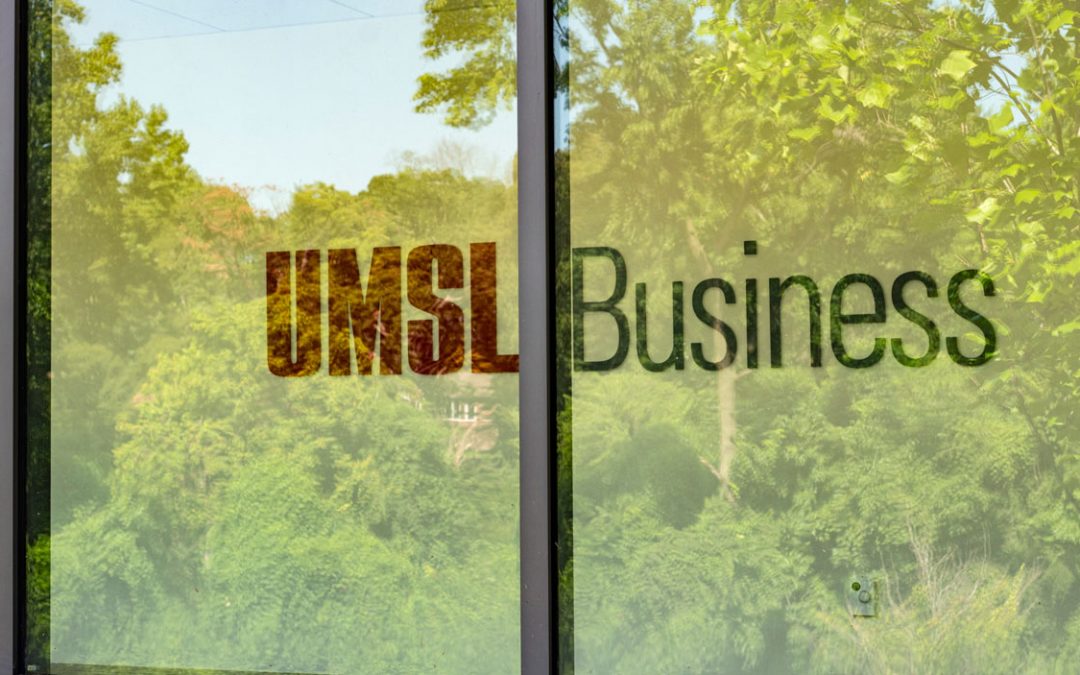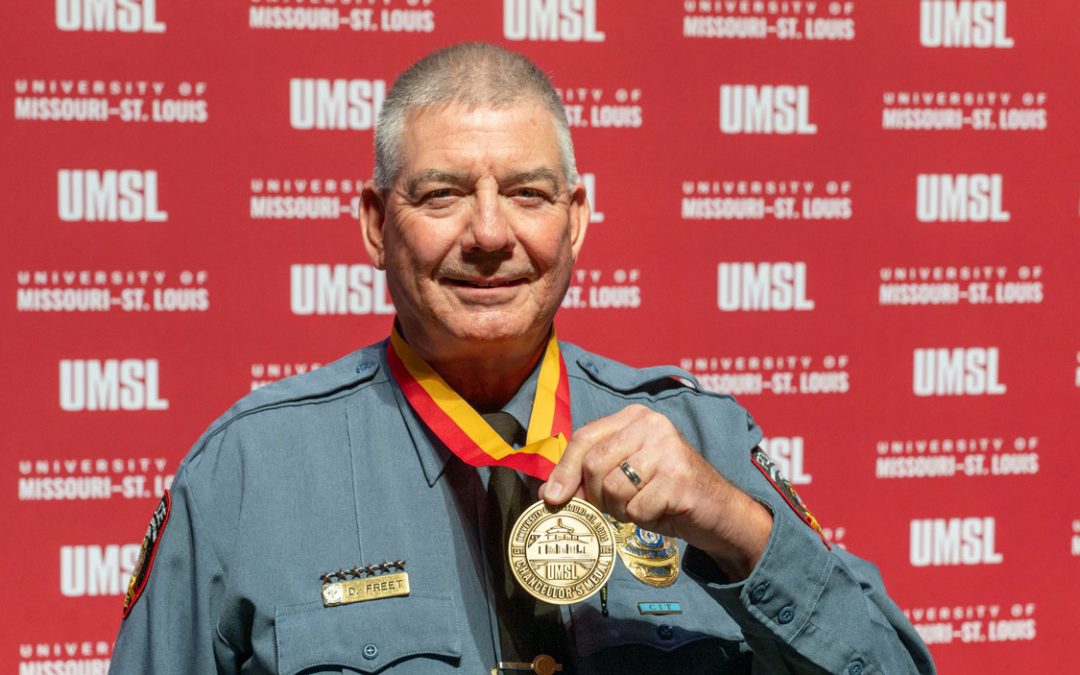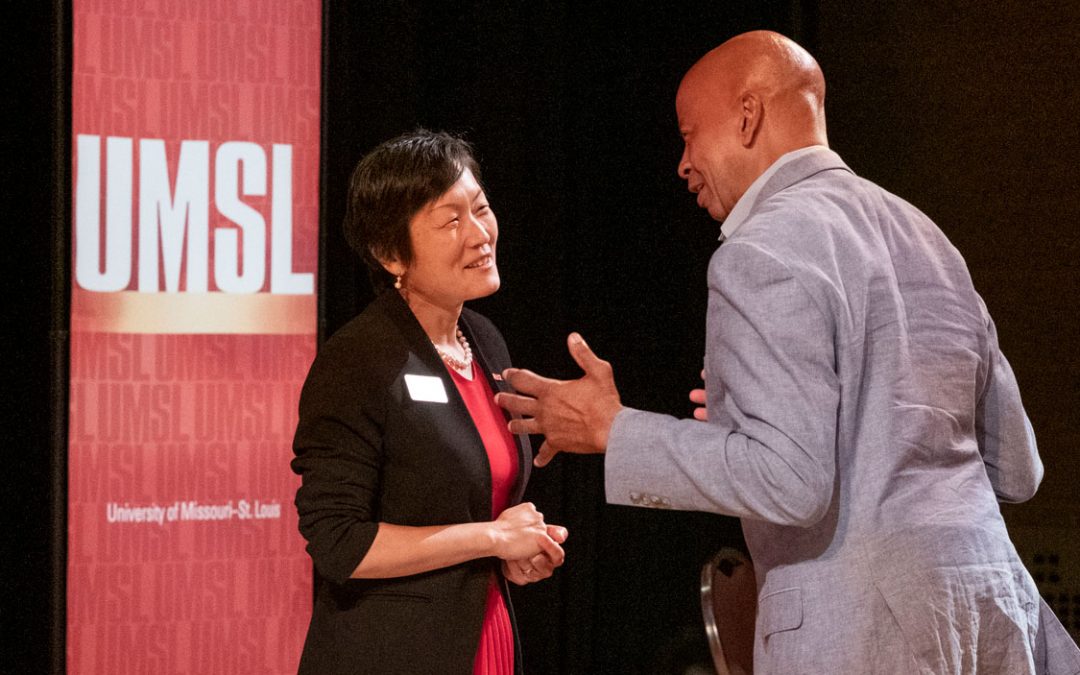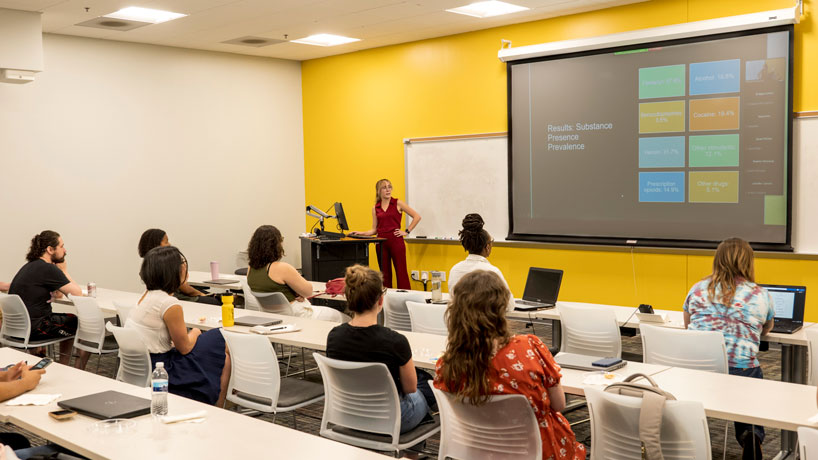
Students in the inaugural Summer SURG cohort wrapped up the program with a presentation of their summer research projects. (Photo by August Jennewein)
The Addiction Science Team of the Missouri Institute of Mental Health has spent the past several years working to address the escalating overdose and addiction crisis in the region. Director Rachel Winograd and her colleagues partner with organizations across the state, including treatment providers, prevention coalitions, recovery community centers and Harm Reduction Street Outreach teams, in an effort to bring down the opioid overdose death rate in Missouri.
This team knows firsthand that having a smart, compassionate workforce is essential to combating substance use – and they are hopeful a new program through the University of Missouri–St. Louis can help with that.
“We will always have drug use, and we will always have addiction,” Winograd said. “This is not going away anytime soon, so we need a smart and engaged workforce who’s committed to making a difference. UMSL has seen this and supported the growth of people and units and departments who are doing work related to substance use. This is absolutely a public health crisis that needs all hands on deck.”
Winograd, who started at MIMH in 2016 and who has maintained a dual appointment there since transitioning to a position as associate professor in the Department of Psychological Sciences last year, runs and leads grant-supported work related to the overdose and addiction crisis. She and her colleagues Devin Banks, Zach Budesa and Ryan Carpenter, along with Chelsey Wilks, who has since left UMSL to go into private industry, created the new Summer SURG program out of a desire to integrate these two departments.
“Over in the psych department, there are a few of us whose area of research is addiction,” she said. “We realized we really needed to do something to merge these worlds a little bit more in a way that makes sense and is mutually beneficial. In the clinical psych PhD program, we had these very bright students who were on nine-month appointments. During the summer, they either find other jobs or just try to make things work, but ideally, they would get funding to do something within their field. And on the MIMH side, I had some grant dollars that could support that.”
From May to August of this year, the Addiction Science Team at MIMH welcomed five students in the PhD Clinical Psychology Program to its inaugural Summer SURG cohort. For 20 hours each week, students Kanila Brown, Arielle Guillod, Melissa Nance, Julia Richardson and Khrystyna Stetsiv split their time contributing to the AddSci team’s efforts to combat substance use in the community and conducting their own personal research projects on overdoses.
They packed thousands of harm reduction tools such as naloxone kits and fentanyl test strip kits for distribution across the state, conducted literature searches about emerging research on substance use-related topics, created eye-catching infographics featuring resources for people impacted by addiction and helped the team increase its community presence at various summer events including health fairs and opioid awareness walks.
The rest of the time was devoted to the students’ summer research projects, which utilized data that the AddSci team has collected through MIMH grants. Four out of the five students looked at specific patterns in overdose death trends in the St. Louis region over the past 10 years. Specifically, they utilized data from the St. Louis city and St. Louis County medical examiner’s offices to look at different trends as well as geographic, demographic and time patterns in certain types of deaths. Each student used the data set in a different way – one student examined correlates of drug-involved suicide deaths versus drug-involved accidents or overdoses, for instance, while another examined the growing racial disparity in overdose deaths over the past five years.
Nance, a rising second-year student in the doctoral program, used the data to examine patterns in overdose deaths that also involve alcohol. Having studied nerve disorders and the intersection with substance use, she said she had a vested interest in joining the program to learn more about addiction.
“A lot of my research interests have to do with alcohol use and what risks are present for alcohol for different populations, especially when alcohol is mixed with different drugs,” she said. “Because it’s a nervous system depressant, when you mix it with other nervous system depressants, like opioids, there can be elevated risk of overdose.”
Guillod, also a rising second-year student in the program, used a separate data set from the rest of the group for her research project. She dug into data from the Overdose Field Report System launched by MIMH in 2016, which captures self-reported information about any overdose event – fatal or not – to examine patterns, correlates and trends from nearly 10,000 reports across 39 counties in Missouri. Though the report is not comprehensive, Guillod said it provided valuable insights into overdoses throughout Missouri.
“I looked at what can we learn about overdoses from this sample,” she said. “Information about overdose reversals, information about naloxone – looking at the use of it and how often the use of it is successful and who is administering it.”
One goal of the program was for each student to have an abstract, including a summary of their research project and initial findings, that they could submit to a national conference for presentation by the end of the summer. Faculty and funding permitting, the Addiction Science Team hopes to continue to offer the Summer SURG program in the future, with Winograd noting that it gives graduate students a unique experience they can’t always get in the classroom.
“These students definitely got a taste of the real-world impact of this work,” Winograd said. “It’s not just research activities or intellectual exercise – it’s a real human being who is doing programmatic work to improve services for people who use drugs. They got to be a part of that and witnessed some of it firsthand, by packing a ton of naloxone or fentanyl test kits and dropping them off at a local grassroots organization who hands them out on the street, for instance, or sitting in on a community meeting where people were talking about what’s happening in their neighborhoods. I think that’s a type of experience that is often hard to come by in graduate school; personally, I had wonderful training in addiction but I definitely at times felt confined to the academic setting and scope of it all.”
Nance, for one, agrees.
“It was a really rewarding experience all around,” she said. “In addition to filling out my resume with all this cool research, it was nice to feel like I’m giving back to the community by doing something concrete. In graduate school, a lot of our time is spent in classes, writing and learning, and that’s all good for us. But doing something where we’re actually distributing things that can prevent overdoses in the community and talking directly with the people that are affected is an experience you don’t always get in graduate school; sometimes you’re kind of siloed. It was great to be able to do something that’s directly impactful for people today.”


